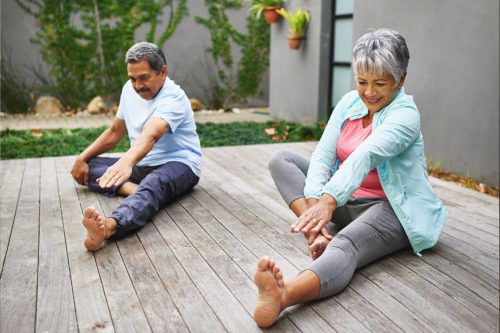As you age, your joints become stiff and less flexible. You may be feeling the everyday effects — perhaps when you get out of bed in the morning, sit for a while, bend over to load the dishwasher or stand on your feet folding laundry.
There’s science behind that pain: The fluid in your joints decreases as you age and the cartilage holding your joints together loses its elasticity and stretch. Fortunately, there are a few simple steps you can take to combat this natural aging process and feel your best. It begins with maintaining an active lifestyle.
Stay Active, Feel Whole
Exercise is one of the best ways to slow or prevent problems with the muscles, joints and bones. A moderate exercise program can help you maintain strength, balance and flexibility. It also helps the bones stay strong and keeps the joints mobile. Best of all, exercise is good for your body, mind and spirit.
The Centers for Disease Control and Prevention (CDC) recommends that most adults need at least 150 minutes a week of physical activity. If 150 minutes sounds a little too daunting, keep in mind you can break it up into 10-minute activities throughout the week.
Grab a friend and go for a brisk walk around the neighborhood. Sign up for a new fitness class at the local Y, gym or fitness center. Or try something new — like swimming or hiking. You’ll hit your 150 minutes before you know it.
Improve Your Range of Motion
Extend, bend or rotate each of your joints to enhance flexibility and mobility. You can relieve stiffness and pain and maintain function.
Strengthen Muscles Around Your Joints
Weight training keeps the muscles that support your joints strong. Resistance bands can safely provide much of the weight and resistance your joints need to stay healthy.
Arthritis Exercise Program
Arthritis shouldn’t keep you from enjoying an active lifestyle. You can do joint-friendly, low-impact exercises to maintain function, range of motion and relieve arthritis pain. Just remember SMART:
- Start low, go slow and see how your body tolerates exercise
- Modify activity when arthritis symptoms increase
- Activities should be “joint-friendly,” like walking, biking and water aerobics
- Recognize safe places to be active, such as level paths and sidewalks away from traffic
- Talk to a health professional or certified exercise specialist to determine which activities best suit your condition
Healthy Habits Also Strengthen Joints
It’s more than exercise that can keep you strong and flexible. Lifestyle choices can also affect your joints – before you even lace up your running shoes.
Drink Water
Keep your body well hydrated. Joint cartilage is mostly water. Dehydration pulls water from your joints to other parts of the body. Stay hydrated to improve joint health.
Eat an Anti-Inflammatory Diet
Lowering inflammation can help keep your joints healthy. Try the Mediterranean diet or load up berries, nuts and leafy greens to fight inflammation.
Maintain a Healthy Weight
Talk to your doctor about a plan that can help you reach and maintain a healthy weight. It can help relieve the pressure and strain placed on your joints, ligaments and muscles.
Stop Smoking or Don’t Start
From that first cigarette, smoking increases your risk for lung cancer. Smoking also increases your risk for heart disease and stroke. It also increases inflammation, making joints and bones harder to heal.
Pay Attention to Your Body
Mild joint discomfort that occurs during exercises, but improves with rest is normal. If the pain doesn’t go away, or stops you from completing your activities, schedule an appointment to your doctor. Together, you can create the plan that’s right for you and boosts your joint health.
Click here to learn more about our AdventHealth medical providers and services available at the Center for Health & Wellbeing.






